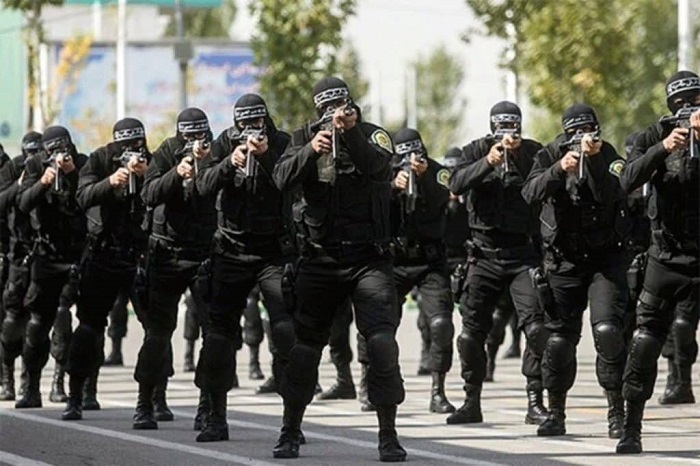
Last week, a 24-year-old man who had expressed admiration for the Revolutionary Guard Corps (IRGC) on social media appeared to be preparing to carry out the 33-year-old fatwa that called for the death of The Satanic Verses author Salman Rushdie. The incident happened just a few days after the US Department of Justice made public information about an IRGC member’s assassination attempt on John Bolton, a former US national security advisor.
Similar information about Albanian authorities’ operations against Tehran’s spies and potential terrorists in that country which also houses the People’s Mojahedin of Iran’s (PMOI/MEK) headquarters-in-exile was made public.
On July 12, search warrants were issued by the Special Court for Combating Corruption and Organized Crime for a number of locations linked to known and suspected Iranian regime agents. It was claimed that the subsequent raids, property seizures, and detentions were carried out to thwart “any potential terrorist attack.”
The threat of such an attack has been widely known in Albania since March 2018, when authorities allegedly thwarted a plan to attack the MEK headquarters with a truck bomb. Three months later, the parent organization of the PMOI, the National Council of Resistance of Iran (NCRI), planned an international gathering of Iranian expatriates and political supporters just outside of Paris. Four Iranian agents, including a senior diplomat, were caught trying to bomb the event.
On the same day that Salman Rushdie was attacked, the coordinator of the European Union’s nuclear negotiations delivered what was referred to as the “final text” of an agreement to reinstate mutual compliance with the Joint Comprehensive Plan of Action to the Iranian government. In response to that text last Monday, Tehran tried once more to drag out negotiations and secure new concessions from its Western adversaries.
Critics have found the regime’s actions to be frustrating ever since the regime’s sincere efforts to revive the deal began 17 months ago. The negotiations were suspended for five months after Ebrahim Raisi was chosen as Iran’s new president in June 2021. Iranian negotiators eventually returned to Vienna for further talks, this time armed with a fresh set of unreasonable demands and a noticeably stronger resolve to not give in. Tehran insisted that its representatives would only return to finalize an agreement based on all of the regime’s outstanding demands after the talks were abruptly ended once more in March.
In any circumstance, Tehran’s obstinacy would be frustrating, but it is especially frustrating now that more people are aware of the terrorist threats that are either directly connected to or closely associated with the Iranian leadership. The regime’s flagrant disregard for all international laws and expectations of impunity is highlighted by these two events. They also reveal the regime’s frailty by demonstrating its inability to give up its backing of terrorism or the prospect of sanctions relief under a revived nuclear agreement.
You missed out on the JCPOA & instead have to deal with the regime’s terrorism & it is getting closer to a nuclear bomb What kind of a policy is this that its victims are western nationals in #Iran ? The main victims are the Iranian people & Resistancehttps://t.co/30baGKQch7
— Maryam Rajavi (@Maryam_Rajavi) July 23, 2022
When Supreme Leader Ali Khamenei presented Raisi as the sole viable candidate for the presidency, significant portions of the Iranian population dubbed him the “butcher of Tehran” Following his election, fresh demonstrations quickly broke out, with the lowest voter turnout in the Iranian regime history. Chants of “death to Raisi” and “death to the dictator,” in reference to Khamenei, were heard.
The rate of executions has more than doubled since Raisi took office, with more prisoners killed in the first half of 2022 than in the first half of 2021. However, this seems to have only heightened global outrage over the regime’s abuses of human rights and protests.
Salman Rushdie’s murder and the information about the assassination attempts on Ashraf 3 and Ambassador Bolton serve as reminders that Tehran’s disregard for human rights extends beyond its own borders. Therefore, decision-makers in the West should understand that their interactions with the Iranian regime must take into account all of its nefarious activities.
 MEK Iran (follow us on Twitter and Facebook), Maryam Rajavi’s on her site, Twitter & Facebook, NCRI (Twitter & Facebook), and People’s Mojahedin Organization of Iran – MEK IRAN – YouTub
MEK Iran (follow us on Twitter and Facebook), Maryam Rajavi’s on her site, Twitter & Facebook, NCRI (Twitter & Facebook), and People’s Mojahedin Organization of Iran – MEK IRAN – YouTub







